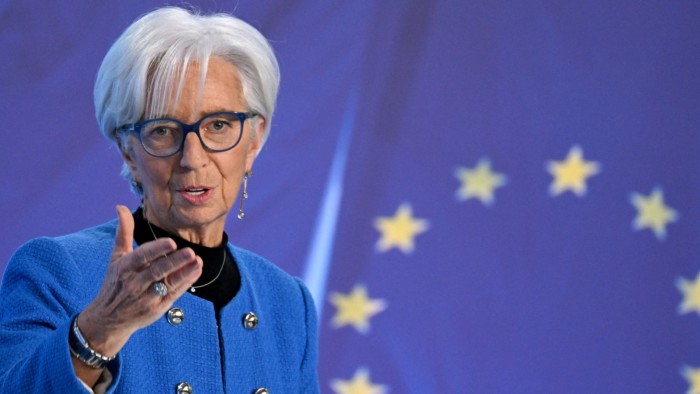Unlock the Editor’s Digest for free
Roula Khalaf, Editor of the FT, selects her favourite stories in this weekly newsletter.
Eurozone inflation unexpectedly ticked up in January to stay above the European Central Bank’s medium-term 2 per cent target for the third month in a row, but the rise was not expected to alter policymakers’ plan to continue lowering interest rates.
The bloc’s statistical office Eurostat on Monday reported that consumer prices in January were 2.5 per cent higher than a year ago, above analysts’ expectations of a 2.4 per cent rise, and up from 2.4 per cent in December.
However, the months of higher inflation — price rises were 1.7 per cent in September — have largely been driven by energy prices that detracted from headline inflation. The acceleration from September is not expected to influence the direction of monetary policy as inflation over the past few months has still been softer than the ECB had forecast.
The inflation numbers comes as US President Donald Trump announced an executive order imposing 25 per cent tariffs on Canadian and Mexican goods starting on Tuesday, though Canadian energy products would be subject to a 10 per cent levy. He also imposed an additional 10 per cent tariff on goods from China.
Trump said a 10 per cent levy on EU goods would “definitely happen”. Economists warn that a US tariff at that level on Eurozone imports and wider economic uncertainty could hit growth in the currency bloc by up to 0.5 percentage points within a year.
Bert Colijn, economist at the bank ING, warned that retaliatory tariffs from the EU would drive rises in inflation as tariffs usually resulted in higher consumer prices.
“With inflationary risks still prevalent and uncertainty increasing, the question is how low the ECB can push rates to give the economy more breathing room,” he added.
Services sector inflation was still significantly above the ECB’s target at 3.9 per cent in January, but the central bank is confident it will come down this year as a result of easing wage pressures. Core inflation, which strips out volatile food and energy prices, was 2.7 per cent, unchanged from December and above analysts’ expectations of a 2.6 per cent rate.
“January’s inflation data won’t change ECB policymakers’ minds about the likely near-term path for interest rates,” said Jack Allen-Reynolds, economist at the consultancy Capital Economics. “The fact that services inflation remained high will mean that they will prefer to loosen policy in small steps.”
The central bank last week lowered interest rates for the fifth time since June by a quarter point to 2.75 per cent, reflecting confidence that inflation will come down to its 2 per cent target over the course of the year. Annual price rises hit a peak of 10.6 per cent in late 2022 following a surge in energy costs.
“The disinflation process is well on track,” ECB president Christine Lagarde stressed last week, strongly hinting that further rate cuts were likely.
“We know the direction of travel,” Lagarde stressed after Thursday’s decision, suggesting it was downwards, adding that the speed, timing and magnitude of future rate moves were going to be decided meeting by meeting.
Official data published last week showed that the Eurozone economy registered no growth in the final three months of 2024, marking a sharp slowdown from the 0.4 per cent growth in the previous three months.
German GDP contracted 0.2 per cent in the final three months of 2024 compared with the previous quarter, while France’s economy unexpectedly shrank 0.1 per cent. Output was flat in Italy.
Read the full article here




